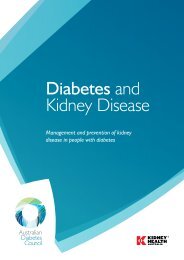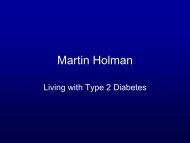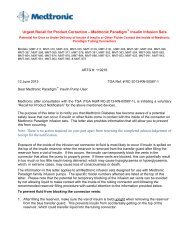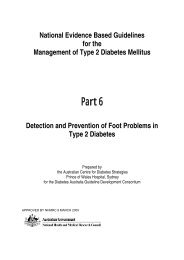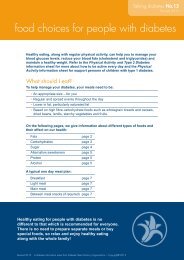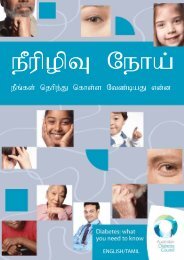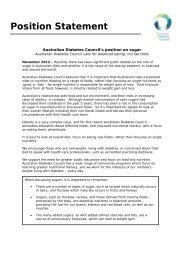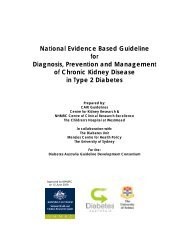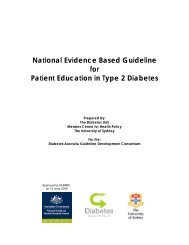O MeA e tAtAU OnA e IlOA - Australian Diabetes Council
O MeA e tAtAU OnA e IlOA - Australian Diabetes Council
O MeA e tAtAU OnA e IlOA - Australian Diabetes Council
You also want an ePaper? Increase the reach of your titles
YUMPU automatically turns print PDFs into web optimized ePapers that Google loves.
15<br />
Short term complications – high blood<br />
glucose (sugar) level (hyperglycaemia,<br />
DKA, HONK/HHS, and sick days)<br />
Hyperglycaemia or high blood glucose levels is when the blood glucose (sugar) levels are<br />
much higher than recommended – above 15mmol/L.<br />
Blood glucose levels go high because of:<br />
• Eating too much carbohydrate<br />
• Not taking enough insulin or oral diabetes medications<br />
• Sickness or infection<br />
• Emotional, physical or mental stress<br />
• Certain tablets or medicines, (including cortisone or steroids)<br />
• A problem with your blood glucose meter, strips or testing technique<br />
• Lumps present at the injection site (if on insulin)<br />
• Fingers not clean when testing your blood<br />
• Testing too soon after eating. (Check your blood glucose two hours after the start of a<br />
main meal).<br />
Signs and Symptoms<br />
You may feel:<br />
• Tired<br />
• Thirsty<br />
• Pass urine more frequently<br />
• Blurred vision<br />
• Generally unwell.<br />
If feeling unwell<br />
• Test your blood glucose levels more often: at least every 2 – 4 hours<br />
• Drink fluids and continue to eat normally if possible<br />
• Treat the cause of the illness<br />
• Tell someone and have them check on you.<br />
Test for ketones if advised to do so by your doctor.<br />
When do I need to call my doctor?<br />
Contact your doctor for advice during illness if:<br />
• You can’t eat normally<br />
• You are not well enough to monitor your blood glucose levels<br />
• Your blood glucose level is higher than 15 mmol/L for more than 12 hours<br />
• Vomiting or diarrhoea continues for more than 12 hours<br />
• You continue to feel unwell or become drowsy.<br />
It is important to have a written sick day management plan prepared before you get<br />
sick or unwell. Talk to your diabetes health care team to arrange this.<br />
Ketone Testing and Diabetic Ketoacidosis (DKA)<br />
Ketones are chemicals in the blood which are produced from the breakdown of fat. If the<br />
body has no insulin present, glucose (sugar) can’t be used for energy. Therefore the body<br />
makes ketones to provide a different source of energy. This may occur due to poor control of<br />
diabetes, not enough insulin or missed insulin doses, illness or infection.<br />
62




